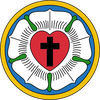Selected Homilies
Here are a few homilies representative of those preached at UniLu. (Most homilies here are preached from an outline but, occasionally, enough people ask for "a copy of your sermon" that the notes get translated into something one can read. Here are those translations.)

 RSS Feed
RSS Feed